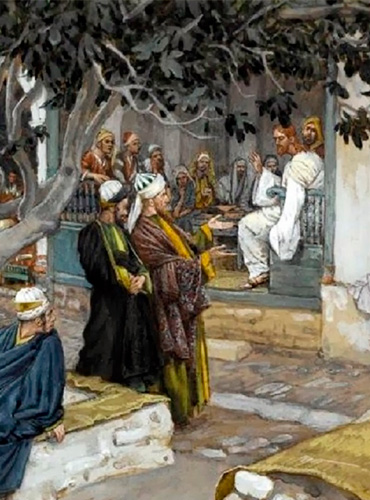Friday after Ash Wednesday – Mt 9:14-15
Today’s brief Gospel passage from Matthew, all of two verses, starts by showing us how not to fast. That question from John’s disciples echoes in our ears. Although we can’t know the motivations of John’s followers, it should call our attention that they specifically use the word πολλά, polla, meaning they don’t simply fast; they fast often, or much, and they make it a point that they want Jesus (and anyone else who happens to overhear) to know it. On one hand, had they just left out that word, their question to Jesus would’ve been the same. It’s not like they needed to tell Christ how much they fast, since it doesn’t really matter for the inquiry. On the other hand, compared to Jesus’ forty day fast in the desert (which Matthew records in chapter 4), it seems a little presumptuous to say they fast often or much; really what they do isn’t that much and, if they really had a deep understanding of the seriousness of their sins, there’s no way they could call their penance often or great.
Thus, here we can see two important aspects of penance that we should keep in mind: first, penance is a good thing, a great means by which we can atone for our sins and discipline our fallen nature, but it remains just that: a means to an end, which is God Himself. To do a great deal of penance doesn’t mean we’ve reached the mountaintop of perfection, and penance is good only insofar as it is directed to God and leads us to Him.
Secondly, when we bear in mind the vileness of our sins and Jesus’ perfection, we see clearly that no amount of penance can ever fully atone for the injury done by our sins. Rather than discourage us, this thought should fill us with hope, because on the one hand, it keeps us from becoming proud and making penance an end unto itself, and, on the other, it reminds us that Jesus is the reason why we do penance in the first place. When we see how much He gave for us, we should be inflamed the love and the desire to do great things for Him. Like Saint Claude de la Colombière wrote, “When I see of how little account I am, and what it is I can do for God’s glory by emptying myself in His service, I am ashamed at the mere thought of depriving Him of anything.”
In a commentary attributed to Saint Basil, the author offers an interesting perspective on Jesus’ reply. He writes that “true death is not a result of hunger for bread . . . but as a result of a hunger for hearing the word of the Lord. True death arises in the souls of those who do not hear, for ‘one does not live by bread alone, but by every word that comes forth from the mouth of God.’ This is why . . . they cannot fast.” In other words, the disciples wouldn’t deprive themselves of the Living Bread come down from heaven; in this sense, like guests at a wedding, they are eating their fill of every word from Christ.
As we start this Lenten season, we can ask ourselves about the penances that we have undertaken, and examine ourselves to make sure that we are doing them, just as we do everything in our lives, out of love for God and for His greater glory.
Today, let us pray, through the intercession of Mary, Our Lady of Sorrows, for the grace to embrace penance for the good that it is, and to keep our eyes focused on Christ, especially as we receive the Eucharist.





